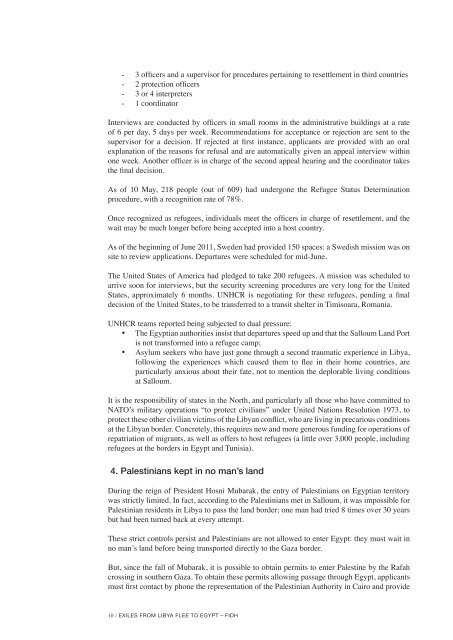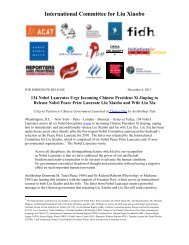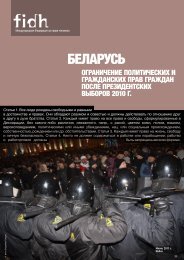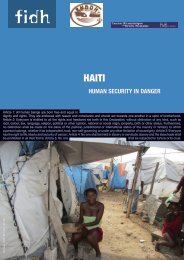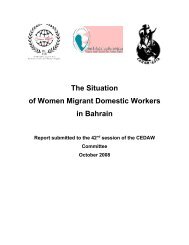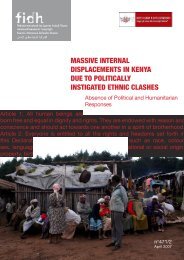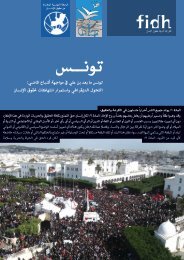Create successful ePaper yourself
Turn your PDF publications into a flip-book with our unique Google optimized e-Paper software.
----3 officers and a supervisor for procedures pertaining <strong>to</strong> resettlement in third countries2 protection officers3 or 4 interpreters1 coordina<strong>to</strong>rInterviews are conducted by officers in small rooms in the administrative buildings at a rateof 6 per day, 5 days per week. Recommendations for acceptance or rejection are sent <strong>to</strong> thesupervisor for a decision. If rejected at first instance, applicants are provided with an oralexplanation of the reasons for refusal and are au<strong>to</strong>matically given an appeal interview withinone week. Another officer is in charge of the second appeal hearing and the coordina<strong>to</strong>r takesthe final decision.As of 10 May, 218 people (out of 609) had undergone the Refugee Status Determinationprocedure, with a recognition rate of 78%.Once recognized as refugees, individuals meet the officers in charge of resettlement, and thewait may be much longer before being accepted in<strong>to</strong> a host country.As of the beginning of June 2011, Sweden had provided 150 spaces: a Swedish mission was onsite <strong>to</strong> review applications. Departures were scheduled for mid-June.The United States of America had pledged <strong>to</strong> take 200 refugees. A mission was scheduled <strong>to</strong>arrive soon for interviews, but the security screening procedures are very long for the UnitedStates, approximately 6 months. UNHCR is negotiating for these refugees, pending a finaldecision of the United States, <strong>to</strong> be transferred <strong>to</strong> a transit shelter in Timisoara, Romania.UNHCR teams reported being subjected <strong>to</strong> dual pressure:• The <strong>Egypt</strong>ian authorities insist that departures speed up and that the Salloum Land Portis not transformed in<strong>to</strong> a refugee camp;• Asylum seekers who have just gone through a second traumatic experience in <strong>Libya</strong>,following the experiences which caused them <strong>to</strong> <strong>flee</strong> in their home countries, areparticularly anxious about their fate, not <strong>to</strong> mention the deplorable living conditionsat Salloum.It is the responsibility of states in the North, and particularly all those who have committed <strong>to</strong>NATO’s military operations “<strong>to</strong> protect civilians” under United Nations Resolution 1973, <strong>to</strong>protect these other civilian victims of the <strong>Libya</strong>n conflict, who are living in precarious conditionsat the <strong>Libya</strong>n border. Concretely, this requires new and more generous funding for operations ofrepatriation of migrants, as well as offers <strong>to</strong> host refugees (a little over 3,000 people, includingrefugees at the borders in <strong>Egypt</strong> and Tunisia).4. Palestinians kept in no man’s landDuring the reign of President Hosni Mubarak, the entry of Palestinians on <strong>Egypt</strong>ian terri<strong>to</strong>rywas strictly limited. In fact, according <strong>to</strong> the Palestinians met in Salloum, it was impossible forPalestinian residents in <strong>Libya</strong> <strong>to</strong> pass the land border; one man had tried 8 times over 30 yearsbut had been turned back at every attempt.These strict controls persist and Palestinians are not allowed <strong>to</strong> enter <strong>Egypt</strong>: they must wait inno man’s land before being transported directly <strong>to</strong> the Gaza border.But, since the fall of Mubarak, it is possible <strong>to</strong> obtain permits <strong>to</strong> enter Palestine by the Rafahcrossing in southern Gaza. To obtain these permits allowing passage through <strong>Egypt</strong>, applicantsmust first contact by phone the representation of the Palestinian Authority in Cairo and provide10 / EXILES FROM LIBYA FLEE TO EGYPT – <strong>FIDH</strong>


